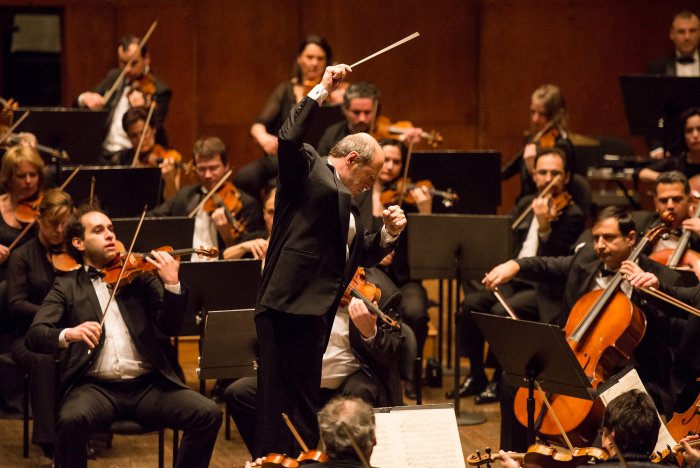Playing on: Producing Music Under Lockdown

Photo: Budapest Festival Orchestra website.
For the past few weeks, the Budapest Festival Orchestra (BFO) has been presenting what it calls “Quarantine Soirées” live from its rehearsal room in Budapest.
The Budapest Festival Orchestra in happier times, under the baton of co-founder Iván Fischer. Photo: Budapest Festival Orchestra website.
I’m writing this on April 22. Tonight’s performance starts at 7:45 and consists of music by Gyula Fekete, Schumann, Piazzolla and Debussy.
The BFO is rated among the top 10 orchestras globally. It performs regularly at venues of the stature of Carnegie Hall and the Lincoln Center in New York and London’s Royal Albert Hall, as well as at prestigious international festivals such as the Mostly Mozart Festival, Salzburg Festival and Edinburgh International Festivals.
In 2013, the BFO was awarded a Grammy for its recording of Mahler’s Symphony No. 1. It has won the Diapason d’Or and the Italian Toblacher Komponierhäuschen prize for its recording of Mahler’s Symphony No. 5 in 2014. The BFO received the Association of Music Critics of Argentina’s award for Best Foreign Symphony Orchestra in 2016.
I share the BFO’s accolades with you so you’ll appreciate that being able to enjoy the orchestra online free – or for the price of a donation if you wish – is a rare privilege. Especially if, like me, you’ve been meaning to see them perform for years and never got round to it.
I haven’t scampered to see the BFO for another reason that I’m somewhat embarrassed to admit. Live classical music often sends me to sleep, despite auditorium seats usually being rather hard. If I’m listening to the BFO on my favorite Lazy Boy Recliner chair and I fall asleep after five minutes, no-one’s going to nudge me in the ribs and hiss in my ear.
Ahead of the Curve
I’m not quite sure why this is surprising to me, but it seems that the BFO was ahead of the curve when it began live streaming its performances online.
Perhaps this is down to the fact that the BFO was only founded in 1983. The vision of its founders, conductor Iván Fischer and Zoltán Kocsis was “to share music of the highest quality and to serve the community in the most diverse ways.” They’re certainly doing that now.
The BFO also has a reputation for innovation, which might explain the speed with which it began streaming. Its Autism-friendly Cocoa Concerts, Surprise Concerts and musical marathons are apparently internationally known.
Perhaps the motivation was also financial. Right now, governments the world over are diverting all available resources into funding health services and equipping key workers – in theory.
But this shouldn’t be used as an excuse to stop funding the providers of the culture that helps hold society together and to which we all turn for escape, consolation and – in the not too distant future, let’s hope – celebration.
Not all musicians can afford to give of their time with such gay abandon as the multitude of icons, from the fresh-faced to the high risk, who took part in the marathon “One World: Together at Home” live streamed concert organized by Global Citizen and the World Health Organization (WHO) on Saturday April 18.
It would be nice to know that these performers, whose combined wealth may well be more than that of Hungary, also donated substantial amounts to fund PPE and development of the vaccine we desperately need.
Charlie Watts of the Rolling Stones at least donated his drum kit. Isn’t it ironic that the highlight of such a momentous music event is a 78-year-old dude who made a virtue out of not playing? But he did it with such good humor and consummate cool.
Acts of God
The Rolling Stones 2020 tour has been canceled, as have all the big events in the rock and roll calendar, including Hungary’s Sziget Festival.
Is Sziget’s cancelation as a result of COVID-19 an Act of God for insurance purposes, I wonder? If it is, the organizers presumably wouldn’t have to pay performers the rest of their fee or, indeed, reimburse people who’ve already purchased their tickets.
An Act of God is generally defined as “an act occasioned exclusive of violence by nature without the interference of any human agency.”
In some insurance contracts, a pandemic is regarded as an Act of God. On March 11, the WHO officially declared COVID-19 a pandemic.
So, if a festival organizer has a contract that specifies a pandemic to be an Act of God, presumably they’re under no obligation to go ahead or reimburse ticket holders.
I’ve no idea what kind of insurance Sziget’s organizers have and, at the time of writing, they’ve yet to issue a statement as to what they propose to do about refunding ticket holders.
The organizers of Glastonbury 2020, for example, have given people who’ve paid a deposit on a ticket the option to ask for a refund or let their deposit roll over to 2021.
Whatever the organizers of Sziget 2020 and the big name acts to whom they may well have advanced serious amount of money decide to do, we can only hope 2021 happens, even if it’s with band-branded face masks and social distancing.
As for the future of live music in general, one ingenious solution has been tried out in Denmark.
In late April, singer-songwriter Mads Langer performed at what may well be the first drive-in concert ever. He did his stuff on stage to an audience listening in their cars via a designated radio station.
Pictures of the event show Langer in front of a sea of vehicles carefully positioned two meters apart from each other.
According to the Consequence of Sound website, Langer was delighted to “reunite” with his audience, “although they were sitting in their cars.”
I don’t know about you, but the thought of a drive-in concert makes me yearn for being center-stage at Sziget in the crush of a heaving ocean of perspiring music fans and being deafened even more.
Find out more about the Budapest Festival Orchestra’s live streamed concerts and how to donate to support them at bfz.hu or via its Facebook page facebook.com/bfo.en.
SUPPORT THE BUDAPEST BUSINESS JOURNAL
Producing journalism that is worthy of the name is a costly business. For 27 years, the publishers, editors and reporters of the Budapest Business Journal have striven to bring you business news that works, information that you can trust, that is factual, accurate and presented without fear or favor.
Newspaper organizations across the globe have struggled to find a business model that allows them to continue to excel, without compromising their ability to perform. Most recently, some have experimented with the idea of involving their most important stakeholders, their readers.
We would like to offer that same opportunity to our readers. We would like to invite you to help us deliver the quality business journalism you require. Hit our Support the BBJ button and you can choose the how much and how often you send us your contributions.






.png)

